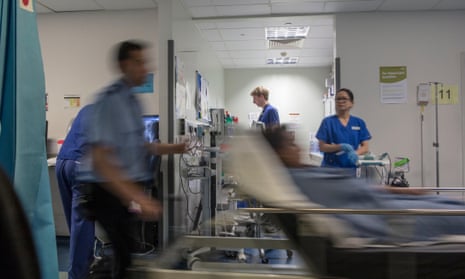Scores of retired NHS doctors and nurses have told the Guardian that they are against returning to work to help tackle coronavirus, with many saying it would threaten their physical and mental health. The government confirmed contingency plans on Tuesday to call back to work NHS “leavers and retirees” to help relieve pressure on an NHS workforce that is expected to be overwhelmed by the virus.
But a majority of 120 former NHS employees who responded to a Guardian callout were resistant, and in some cases hostile, to the idea. Many respondents said unprompted they did not want to a return to a working environment where they suffered stress, bullying, burnout and even breakdowns.
Seventy-one said they would not be happy to return to work, with many expressing their reluctance in vehement terms. “After the way I was treated I would rather shove a rusty six-inch nail up my backside than return to my old job,” said a 67-year-old former staff nurse from Manchester.
Anthony O’Neill, 58, from Glasgow, said: “No, nein, non, nej! Was a hospital physician for 32 years: never ever going back.” And a 60-year-old London GP said: “I left general practice due to burnout. I would not go back under any circumstances.”
A 58-year-old former GP from Northamptonshire said he “jumped ship early” after “being repeatedly shafted by successive administrations”. He asked: “Why would I go back?”
A former senior sister from Wigan said she still has “nightmares 12 years on about the extraordinary working conditions”. Another said: “I left nursing in disgust at the treatment of nursing and ancillary staff by a toxic and bullying management culture.” And a nurse from Cheshire said: “I still feel quite angry that I felt no option but to retire at 55.”
Q&AHow can I protect myself and others from the coronavirus outbreak?
Show
The World Health Organization is recommending that people take simple precautions to reduce exposure to and transmission of the coronavirus, for which there is no specific cure or vaccine.
The UN agency advises people to:
- Frequently wash their hands with an alcohol-based hand rub or warm water and soap
- Cover their mouth and nose with a flexed elbow or tissue when sneezing or coughing
- Avoid close contact with anyone who has a fever or cough
- Seek early medical help if they have a fever, cough and difficulty breathing, and share their travel history with healthcare providers
- Advice about face masks varies. Wearing them while out and about may offer some protection against both spreading and catching the virus via coughs and sneezes, but it is not a cast-iron guarantee of protection
Many countries are now enforcing or recommending curfews or lockdowns. Check with your local authorities for up-to-date information about the situation in your area.
In the UK, NHS advice is that anyone with symptoms should stay at home for at least 7 days.
If you live with other people, they should stay at home for at least 14 days, to avoid spreading the infection outside the home.
Many expressed concern that returning to work would put them at risk of contracting the disease and that their lack of recent practice could put patients at risk.
A 69-year-old former GP from North Yorkshire said he would fear for his life. “It would place me in a position where I would receive a high lethal dose of the virus.” Another former clinician, with a long-term chronic condition, said it would be “suicide” for her to return to frontline duties.
Rick Allen, 60, a retired GP from Kent, said: “GPs will be decimated by the illness as will those who come to replace them. Getting doctors back from retirement is just a government PR exercise to look as if they’re taking serious action. I’d sooner stay at home, batten down the hatches and look after my own family.”
Morag Bell, 67, a retired nurse from Stockton-on-Tees, said: “Surely asking older and more susceptible ex-professionals to assist is counterintuitive.”
Some felt guilty for expressing reluctance to return. One 56-year-old former GP from Devon said: “I was seriously burnt out when I retired and am only just getting to the point where I feel human again. I live in the community where I was a GP. Saying ‘no’ to going back to work would feel difficult and selfish, especially if people in my community were suffering and my former colleagues were overwhelmed by demand but it is not something I want to do.”
A small minority were keen to return with 16 of the 120 saying they would do so without reservations. They included a 79-year-old doctor from Solihull who said: “To help out the country in need would be a unique privilege as a humanitarian and humble service.” Another of those to say they were keen to return to work was a former paediatrician from Bath who previously volunteered to tackle the Ebola outbreak in Sierra Leone.
But most of those who said they would be willing to go back had reservations. Asked if they were willing to return to work, 33 of those who responded provided “yes, but” answers. They included one who would say she would return to work but not at the hospital that offered her “no support following my breakdown”.
